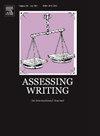Investigating the effectiveness of scaffolded feedback on EFL Saudi students' writing accuracy: A longitudinal classroom-based study
IF 5.5
1区 文学
Q1 EDUCATION & EDUCATIONAL RESEARCH
引用次数: 0
Abstract
Despite the growing body of research on feedback provided to L2 learners on their writing, few studies have investigated the use of a scaffolded approach to feedback. Sociocultural scholars argue that for feedback to be effective it needs to be scaffolded – dynamic and aligned to the learner’s ability to correct their errors (Aljaafreh & Lantolf, 1994). Although research on scaffolded feedback have found it to improve L2 writing accuracy, most of this research has been small-scale, using one-on-one conferences. This larger classroom-based study aimed to examine the effectiveness of scaffolded written feedback and students’ perceptions of this feedback approach. The study was quasi-experimental and implemented over one academic semester. The participants were 71 male students of intermediate English proficiency, majoring in English at a large Saudi university. They were divided into two groups: one group received scaffolded feedback; the other group received unscaffolded (indirect) feedback. The feedback targeted eight grammatical structures. Findings from the immediate and delayed post-tests showed that both groups improved in their overall writing accuracy over time, with no difference evident between the two groups. Moreover, both groups showed similar improvements in six of the eight targeted grammatical structures. The scaffolded feedback group showed greater improvement than their counterparts only on two structures: subject-verb agreement and singular-plural agreement. Interview findings showed that the scaffolded feedback group liked this approach mainly because of its novelty but preferred scaffolding only when it increased in explicitness. We conclude by considering whether and how scaffolded feedback can be provided in classroom settings.
调查脚手架式反馈对英语沙特学生写作准确性的有效性:一项纵向课堂研究
尽管对二语学习者写作反馈的研究越来越多,但很少有研究调查使用框架式反馈方法。社会文化学者认为,为了使反馈有效,它需要建立一个框架——动态的,与学习者纠正错误的能力相一致(Aljaafreh &;Lantolf, 1994)。虽然对脚手架式反馈的研究发现它可以提高第二语言写作的准确性,但大多数研究都是小规模的,使用一对一的会议。这个更大的以课堂为基础的研究旨在检验脚手架式书面反馈的有效性和学生对这种反馈方法的看法。这项研究是准实验性的,实施时间为一个学期。参与者是71名中等英语水平的男生,他们在沙特一所大型大学主修英语。他们被分为两组:一组接受支架式反馈;另一组接受的是直接的(间接的)反馈。反馈针对的是8种语法结构。即时和延迟后测的结果表明,随着时间的推移,两组人的整体写作准确性都有所提高,两组之间没有明显差异。此外,两组学生在8个目标语法结构中的6个方面都有相似的进步。架式反馈组仅在主谓一致和单复数一致这两个结构上比其他组表现出更大的改善。访谈结果显示,脚手架反馈组喜欢这种方法主要是因为它的新颖性,但只有当它增加了明确性时才喜欢脚手架。我们通过考虑是否以及如何在课堂环境中提供脚手架式反馈来得出结论。
本文章由计算机程序翻译,如有差异,请以英文原文为准。
求助全文
约1分钟内获得全文
求助全文
来源期刊

Assessing Writing
Multiple-
CiteScore
6.00
自引率
17.90%
发文量
67
期刊介绍:
Assessing Writing is a refereed international journal providing a forum for ideas, research and practice on the assessment of written language. Assessing Writing publishes articles, book reviews, conference reports, and academic exchanges concerning writing assessments of all kinds, including traditional (direct and standardised forms of) testing of writing, alternative performance assessments (such as portfolios), workplace sampling and classroom assessment. The journal focuses on all stages of the writing assessment process, including needs evaluation, assessment creation, implementation, and validation, and test development.
 求助内容:
求助内容: 应助结果提醒方式:
应助结果提醒方式:


